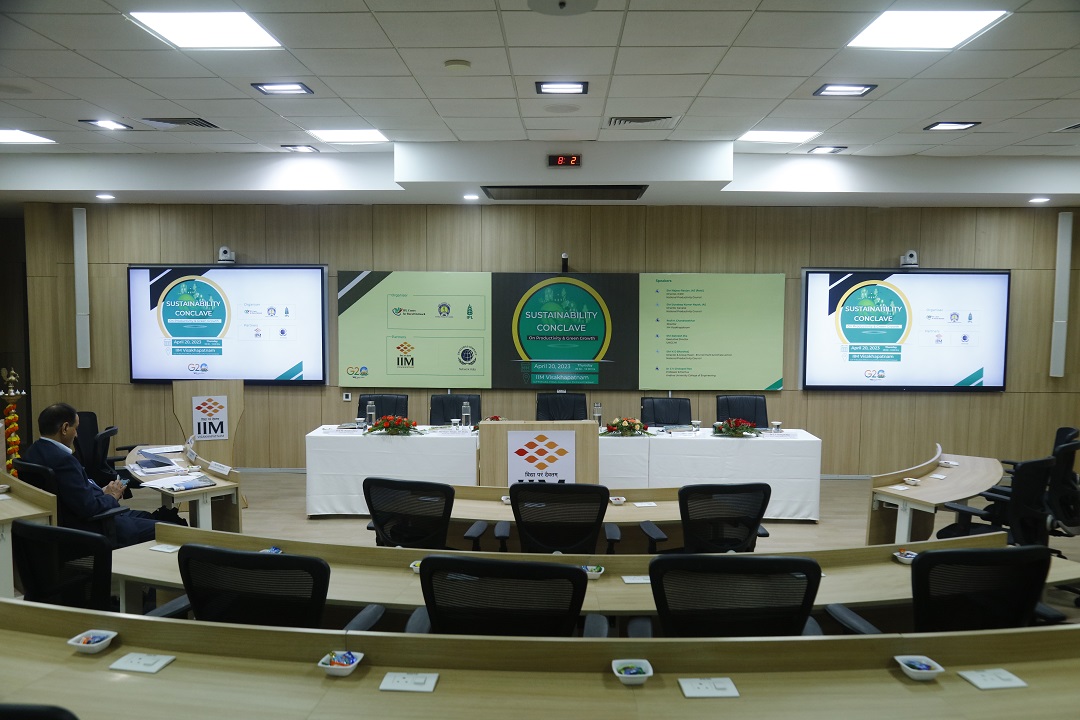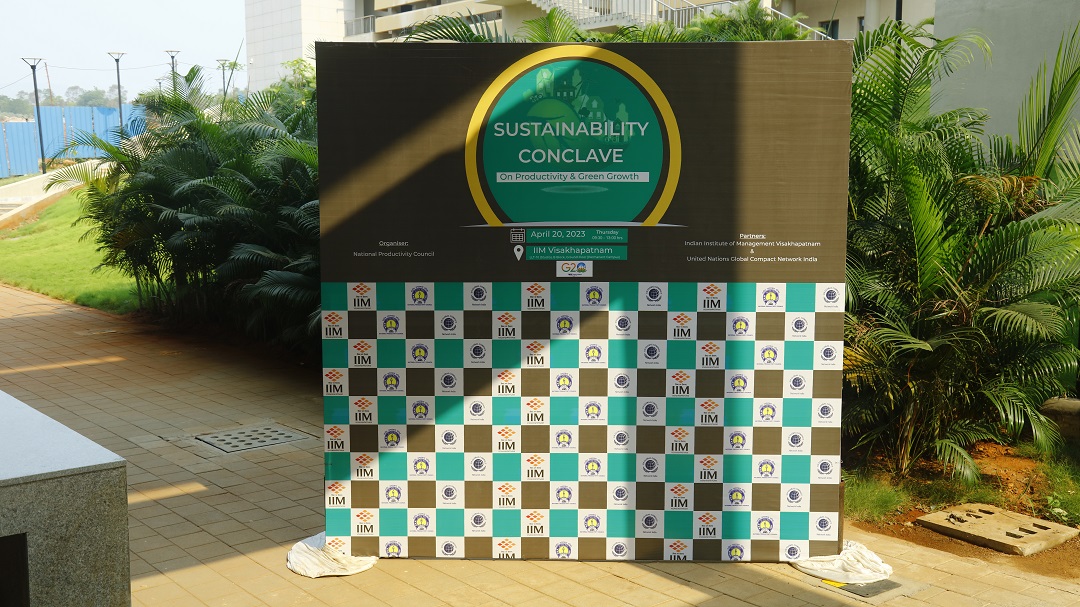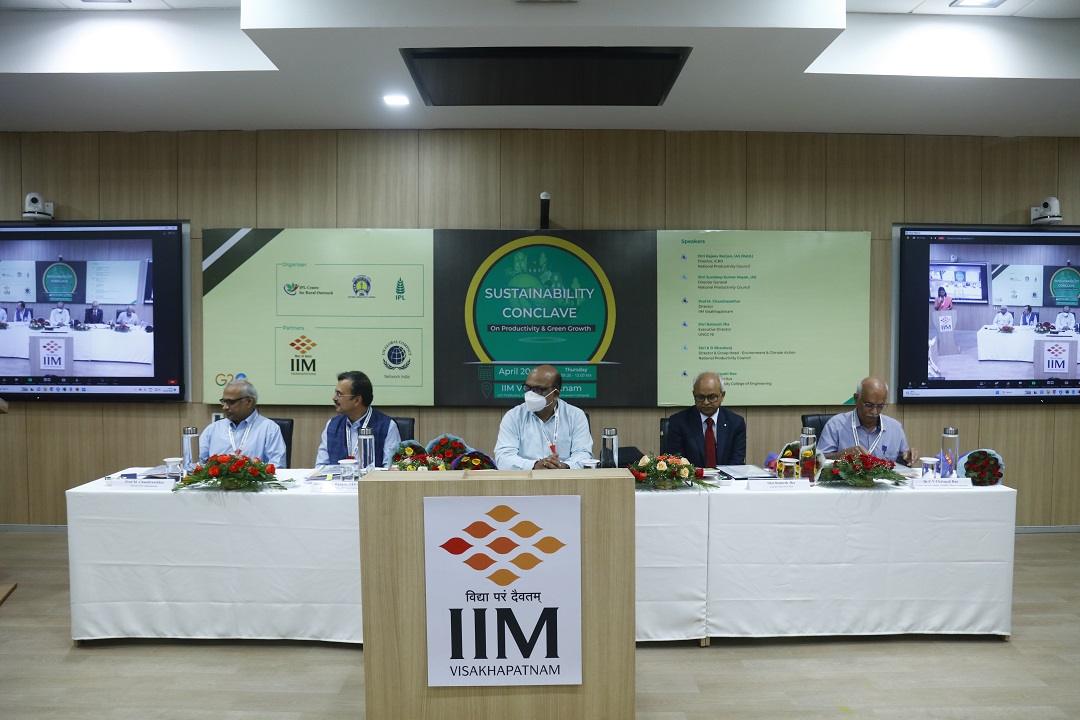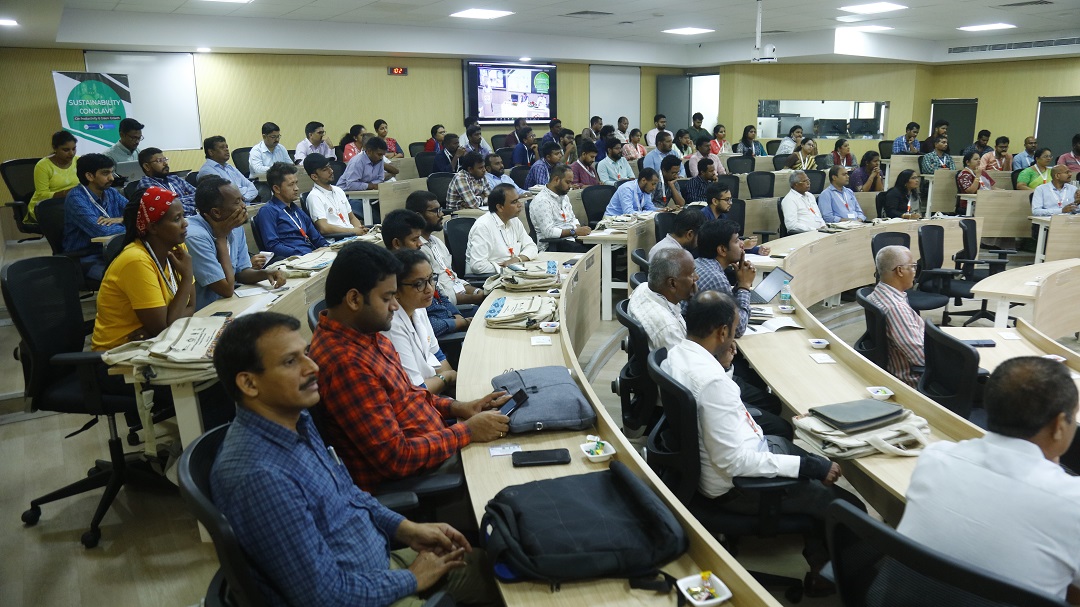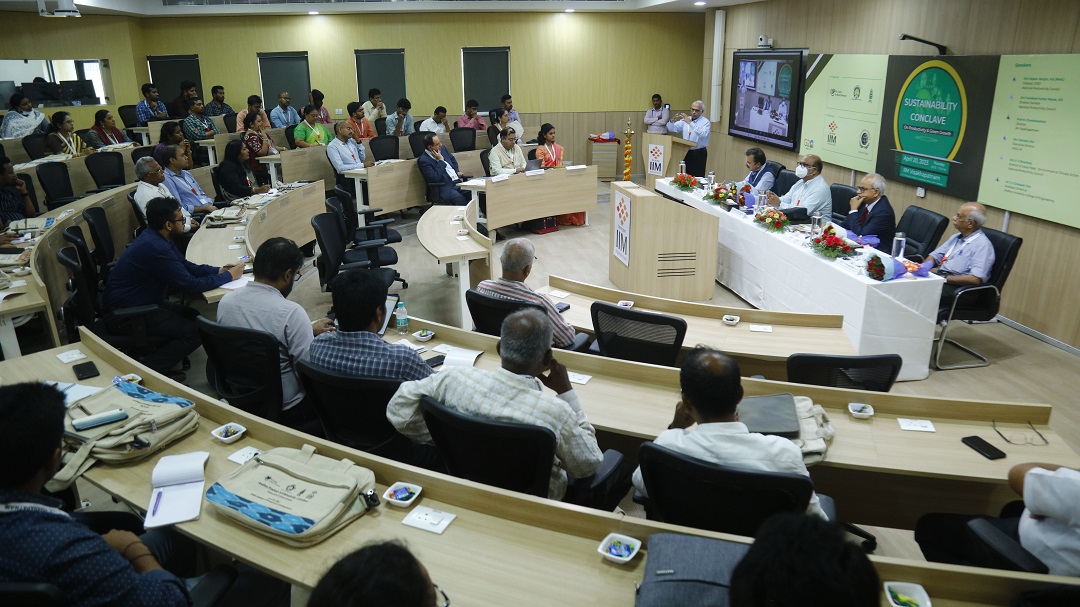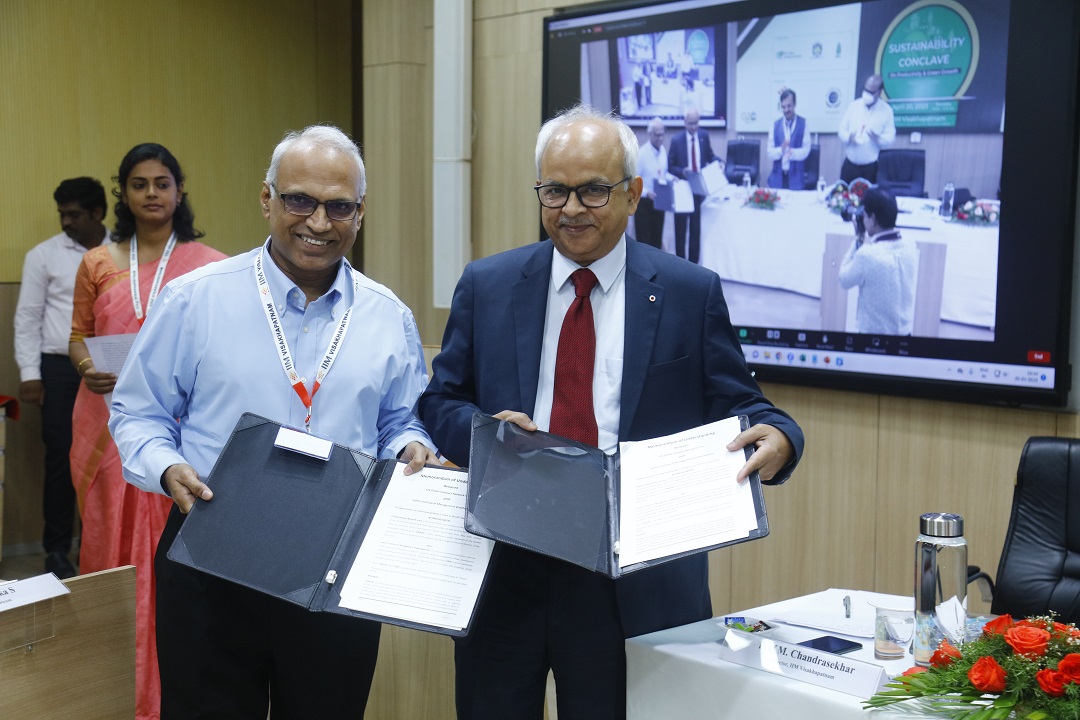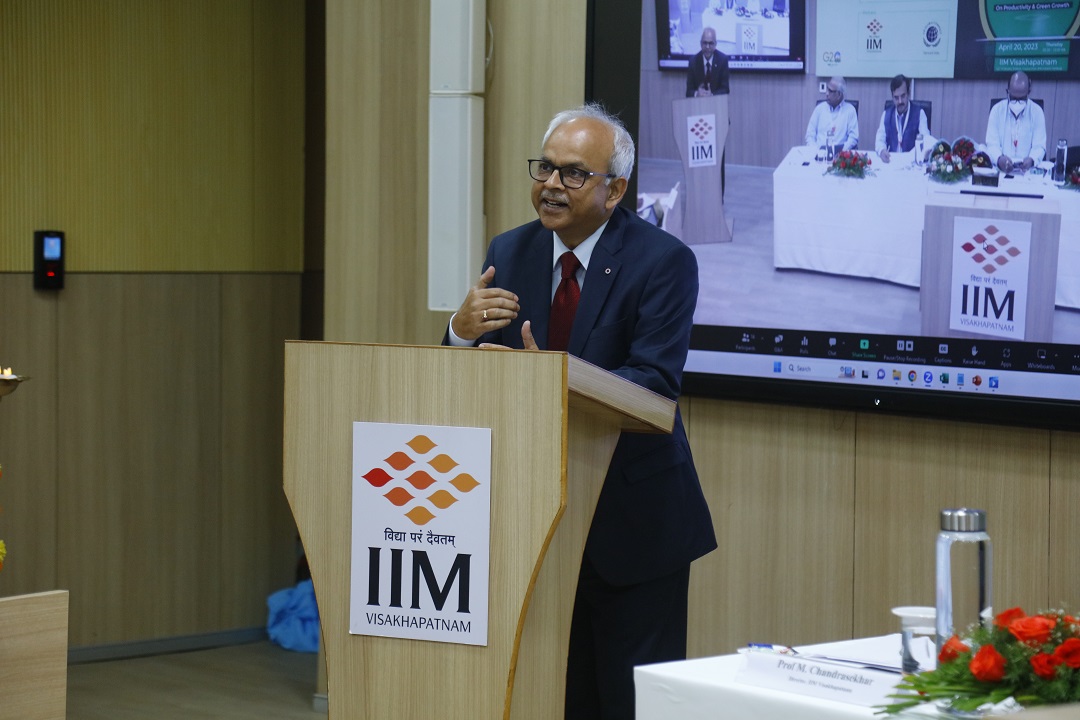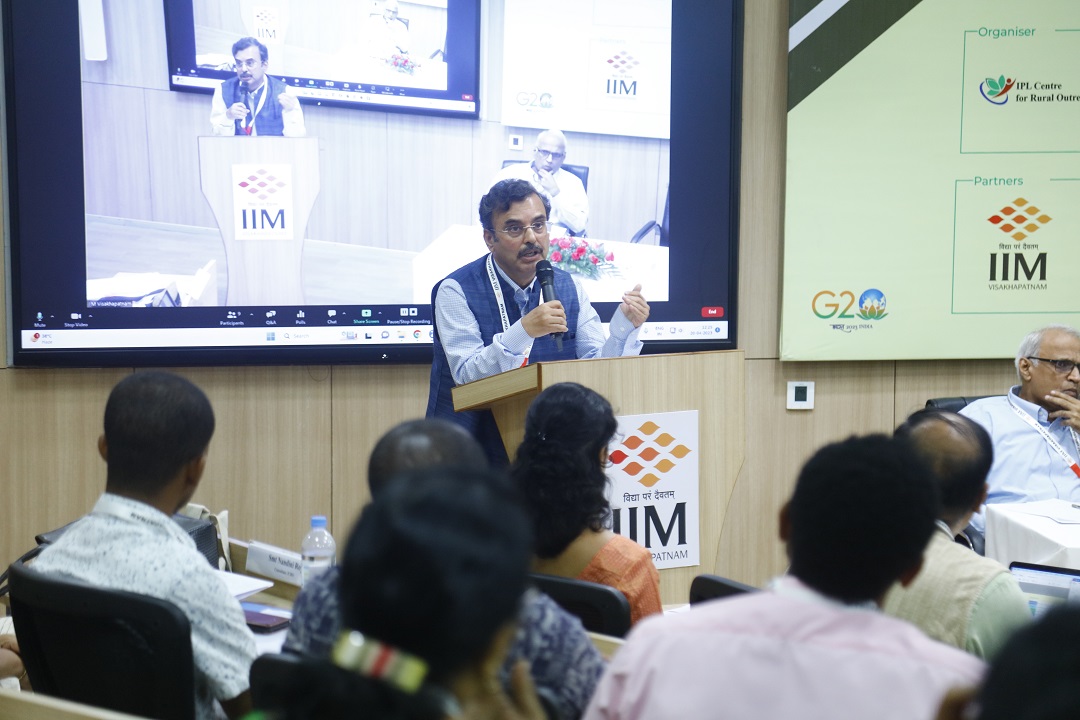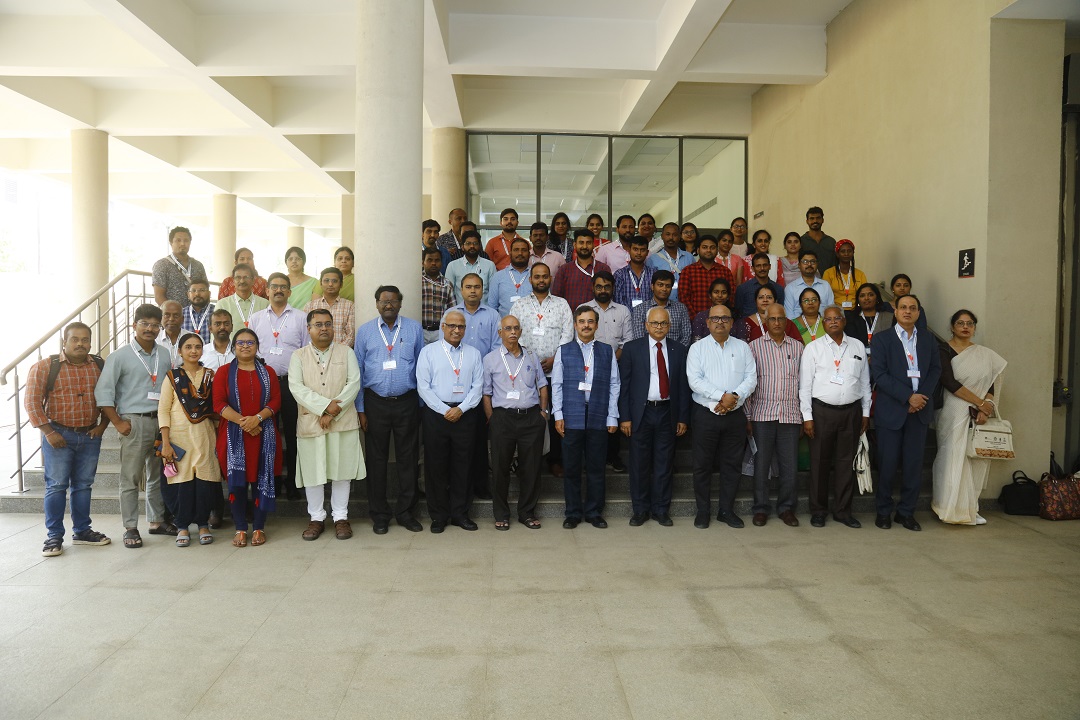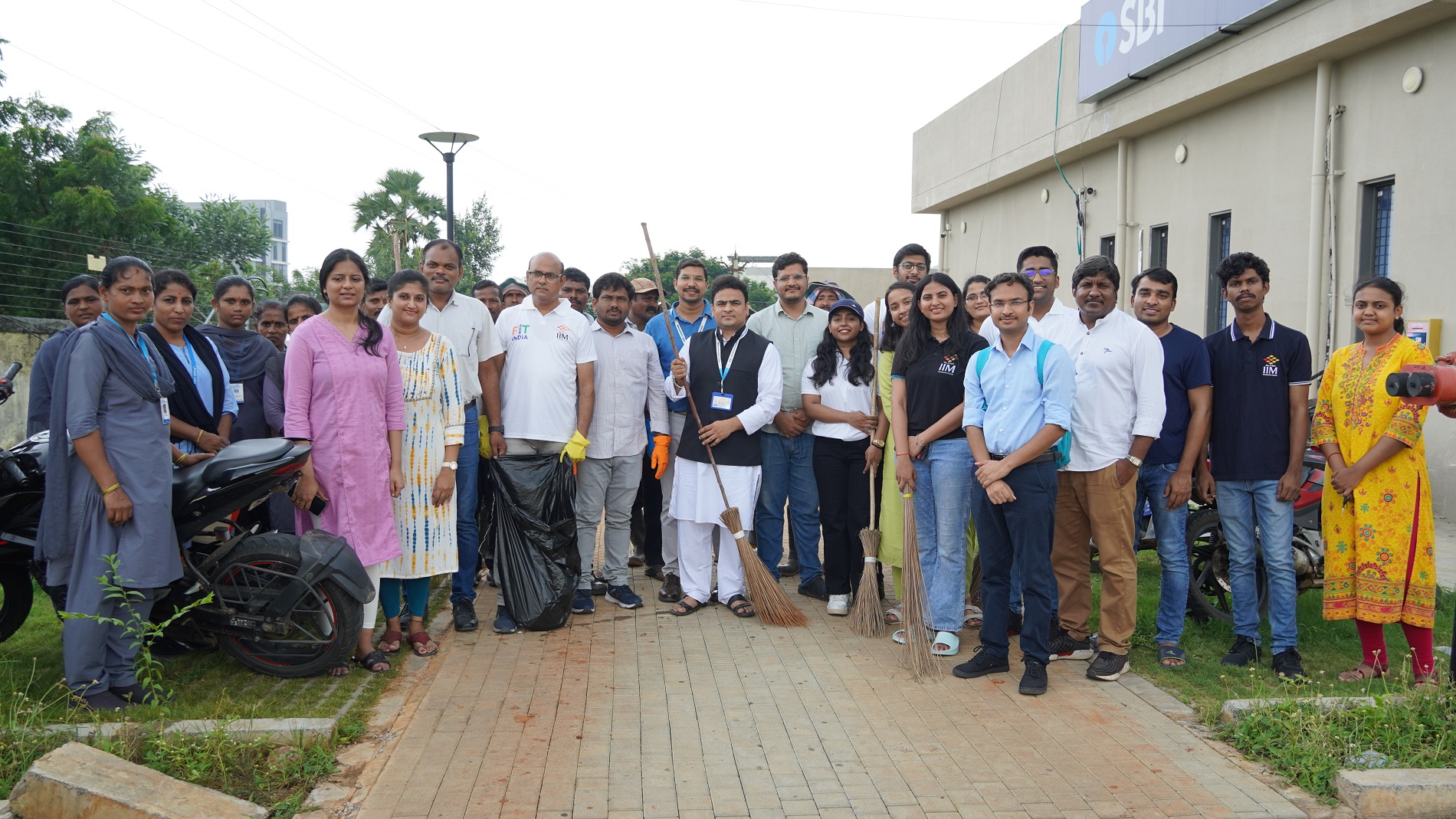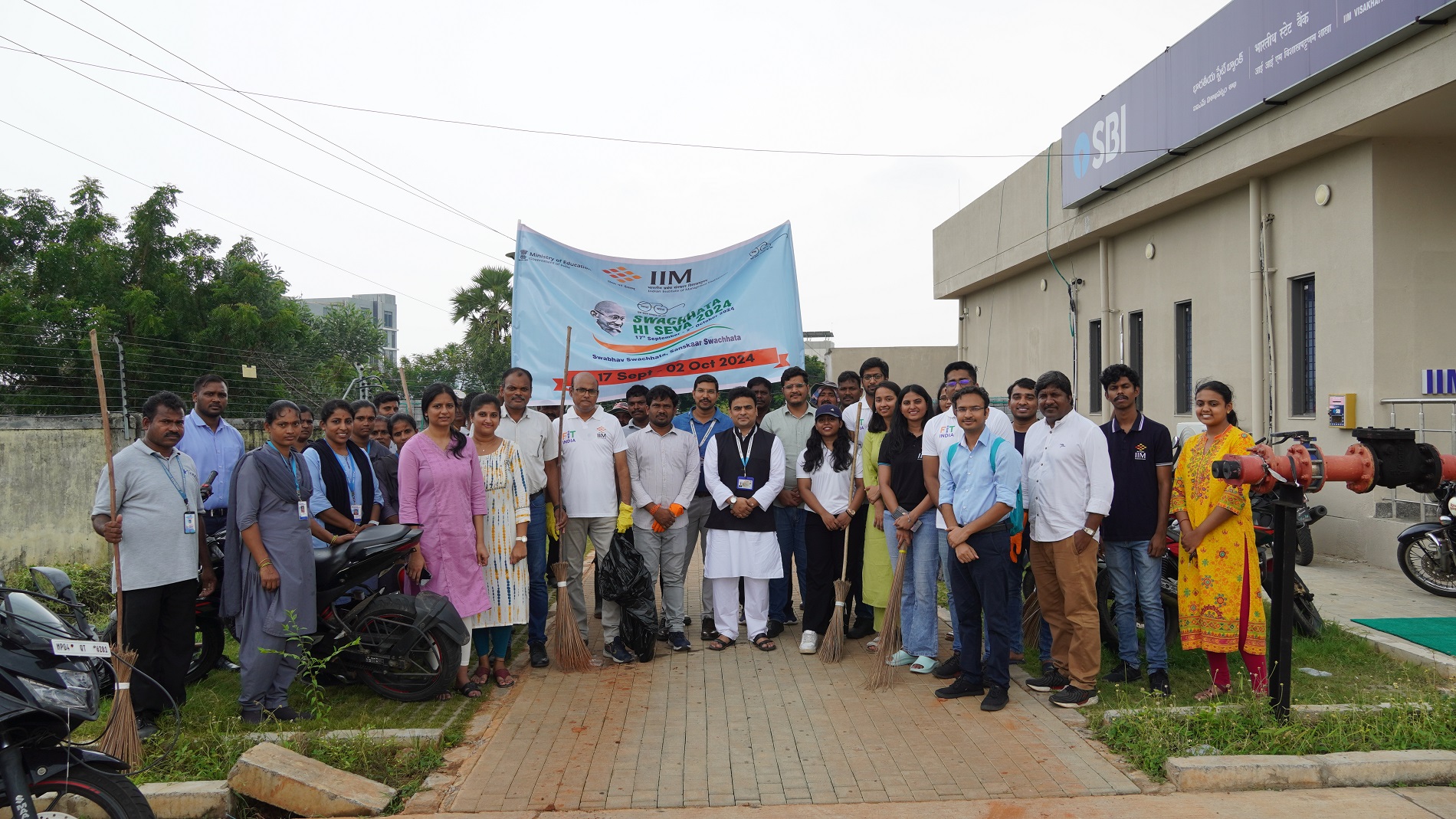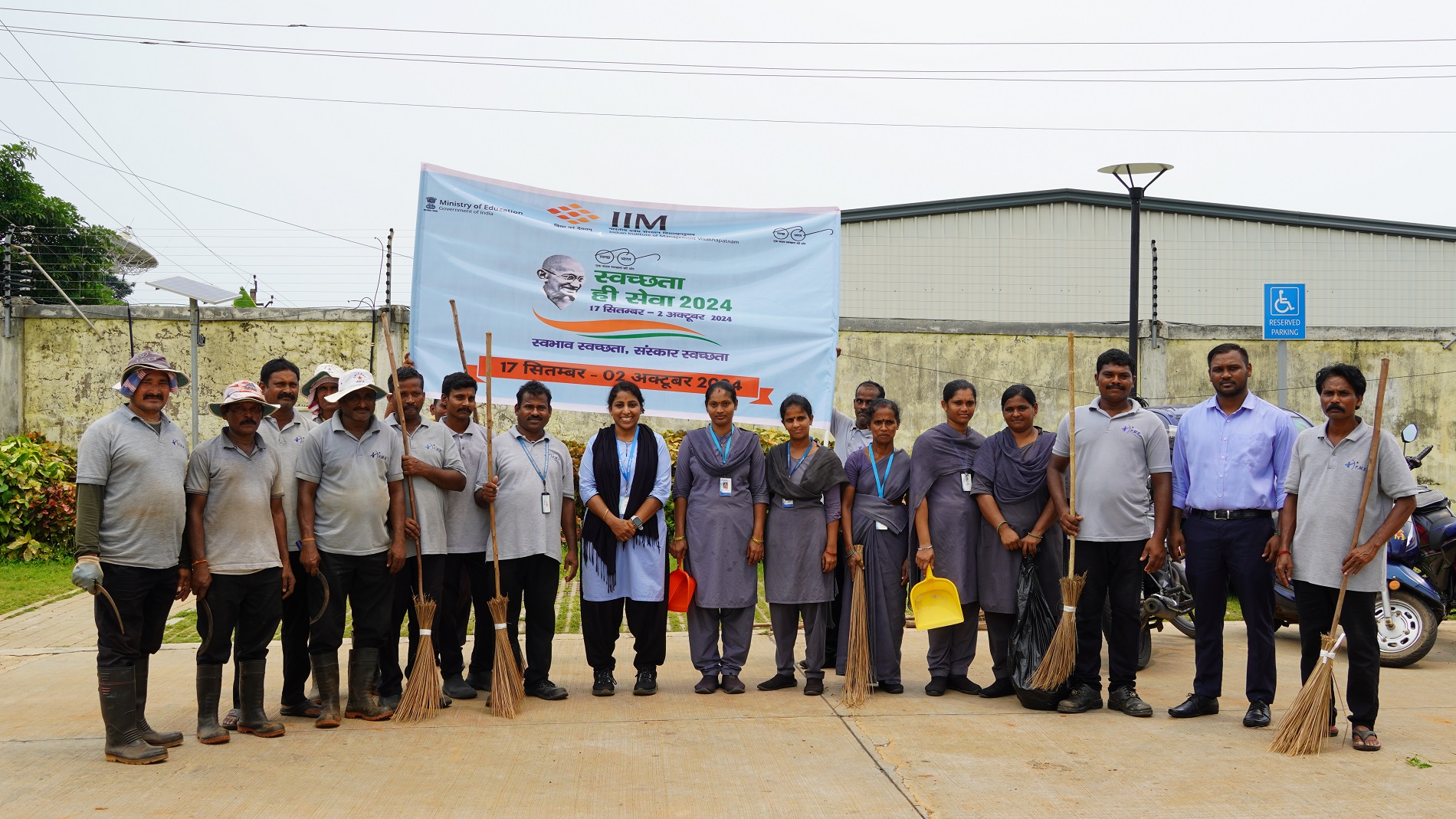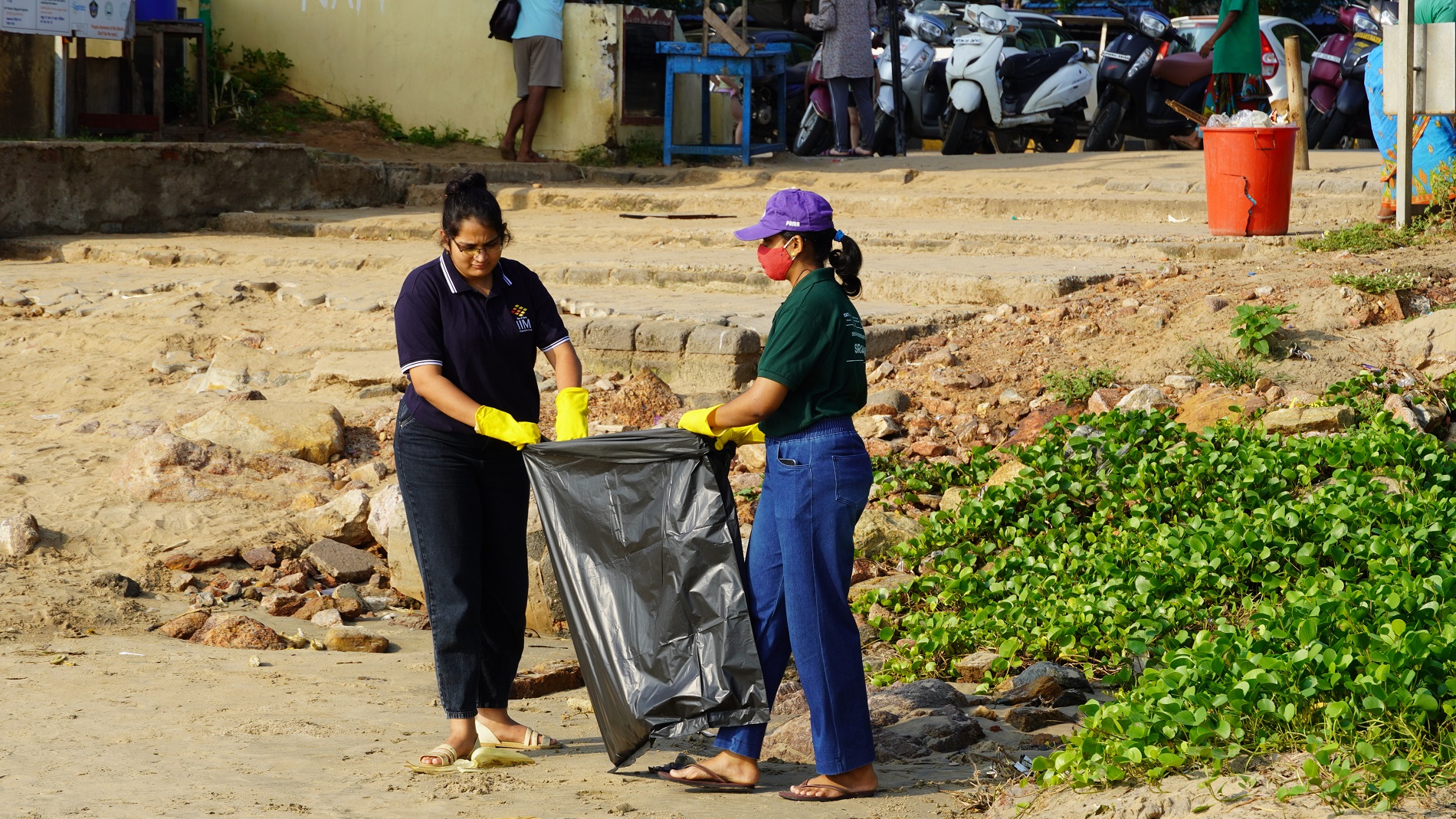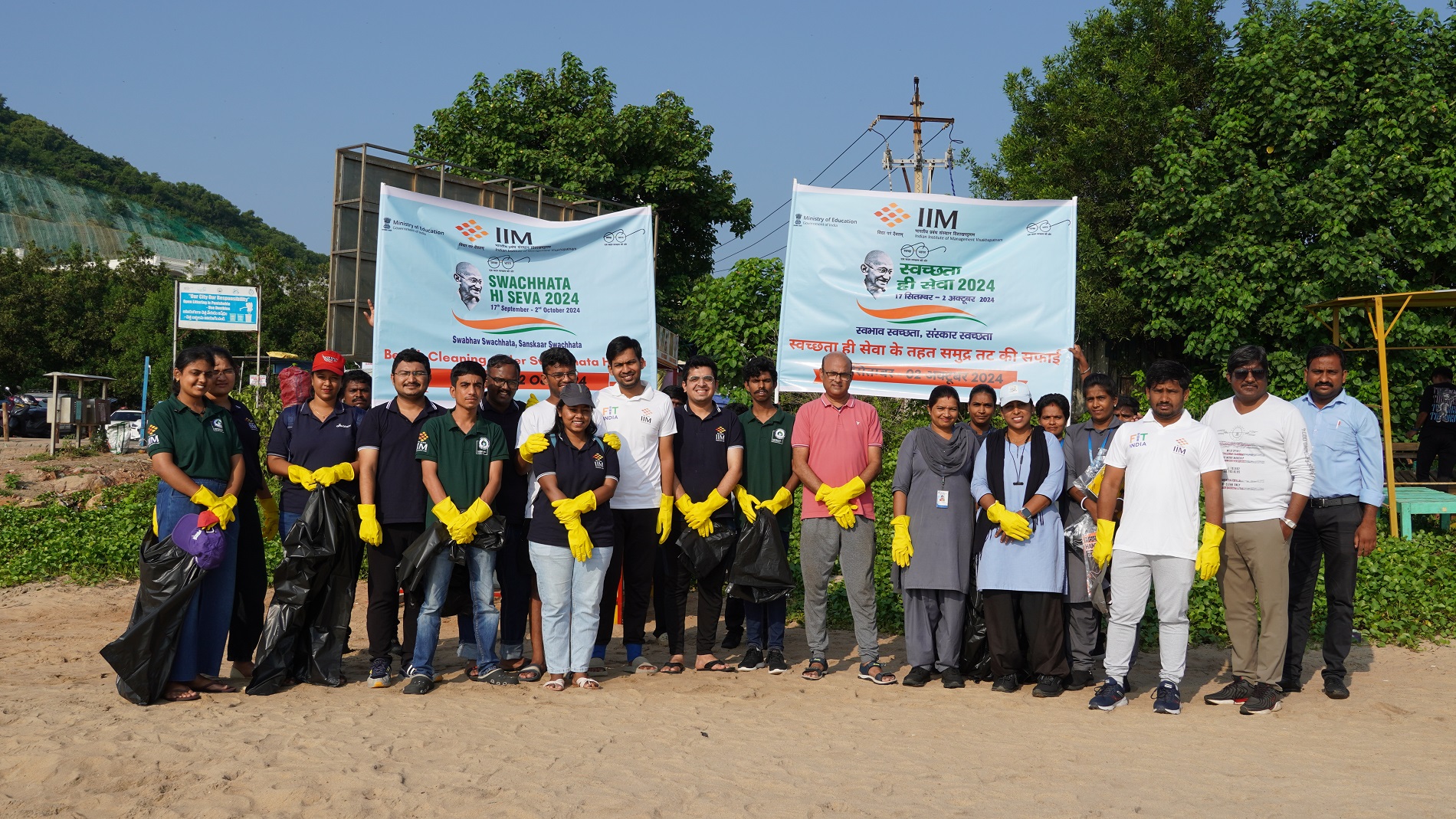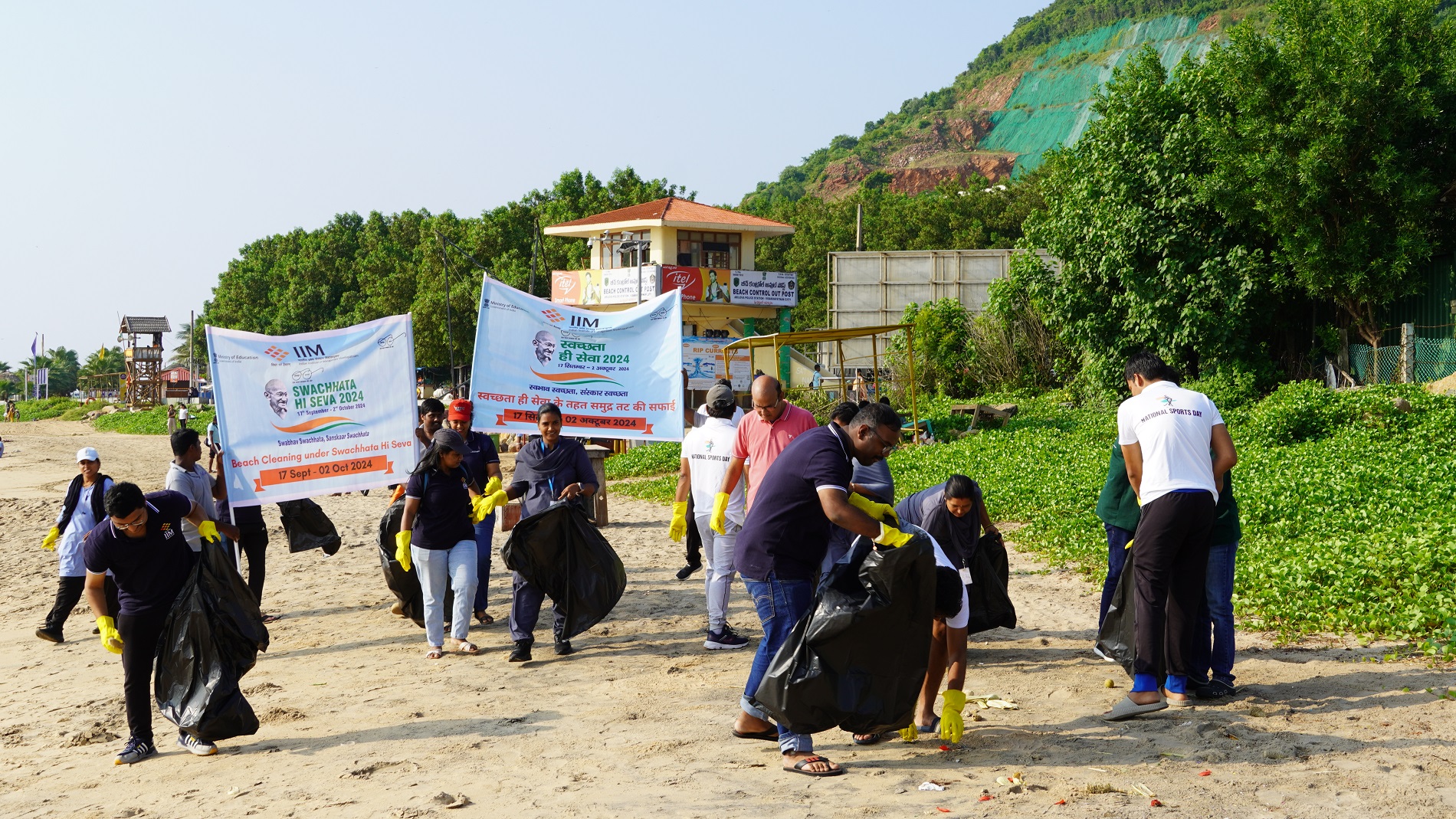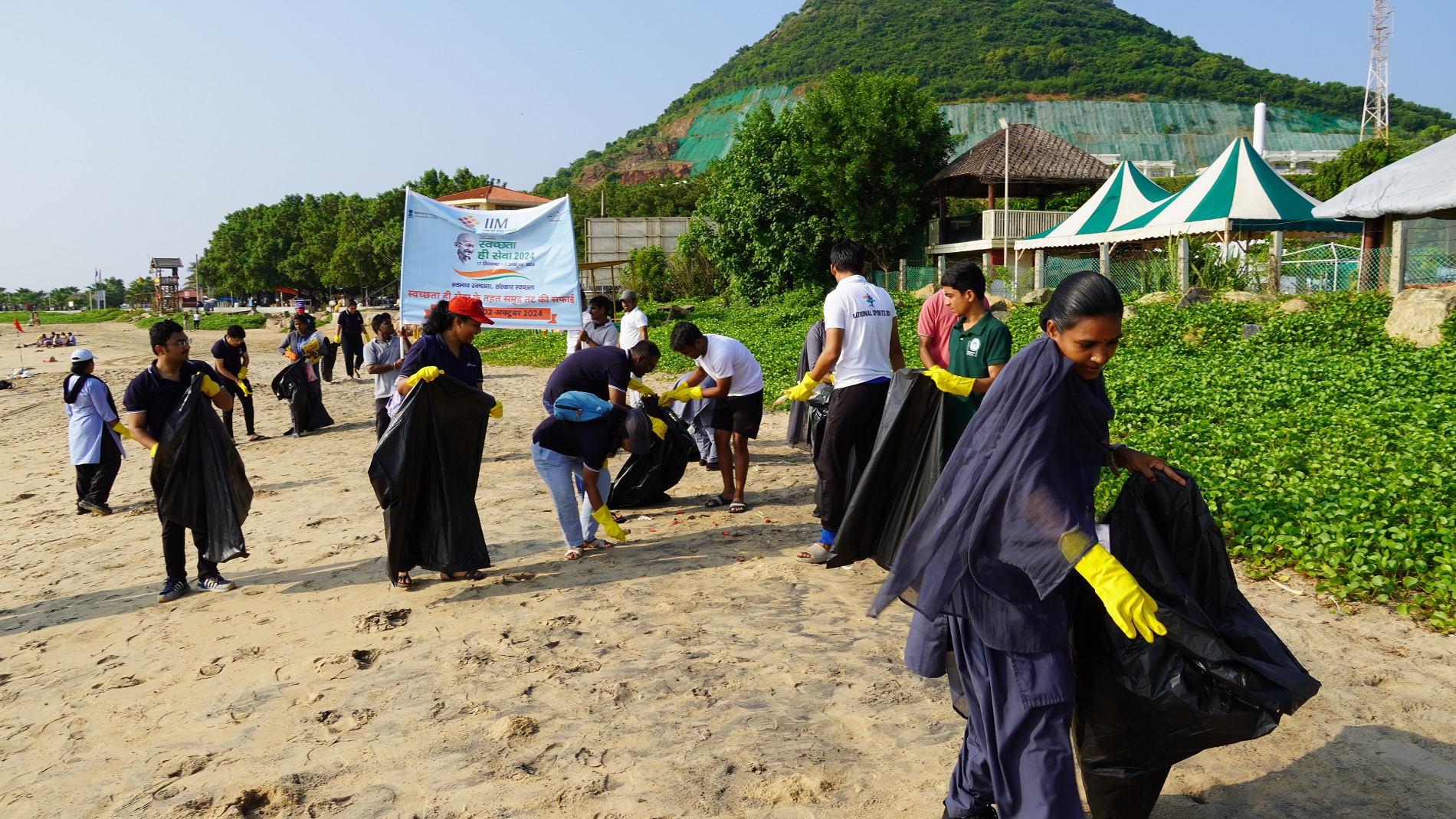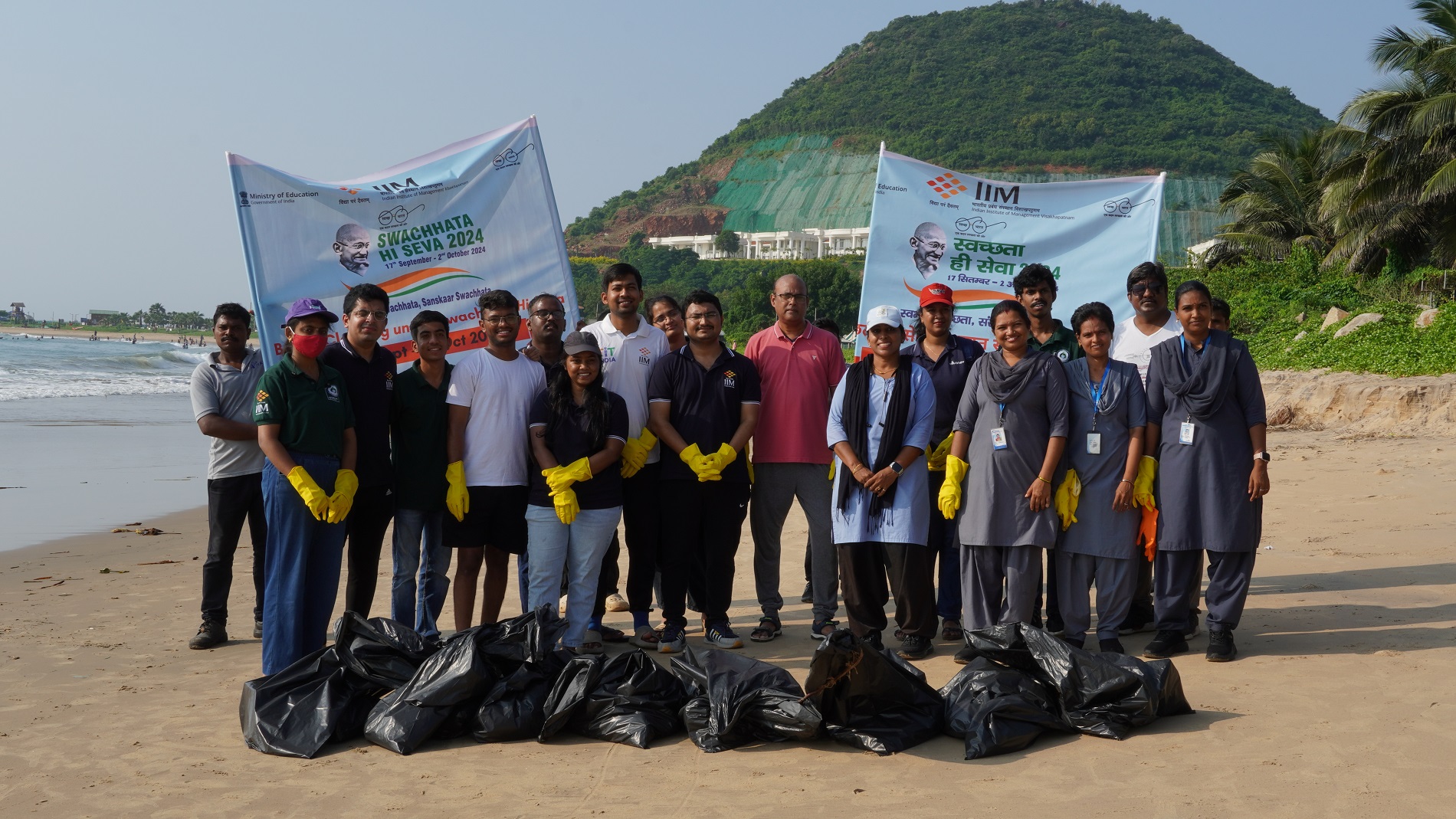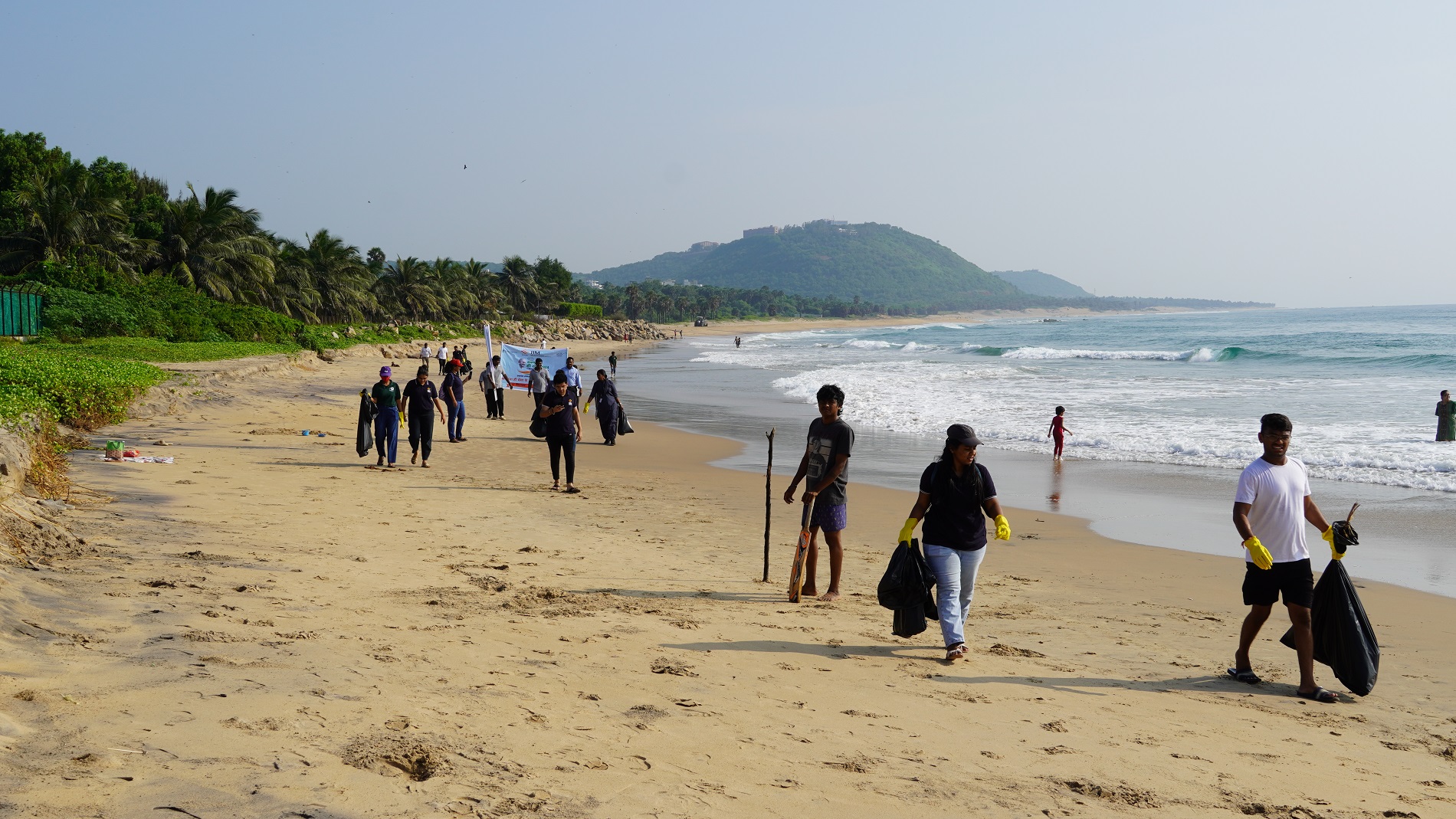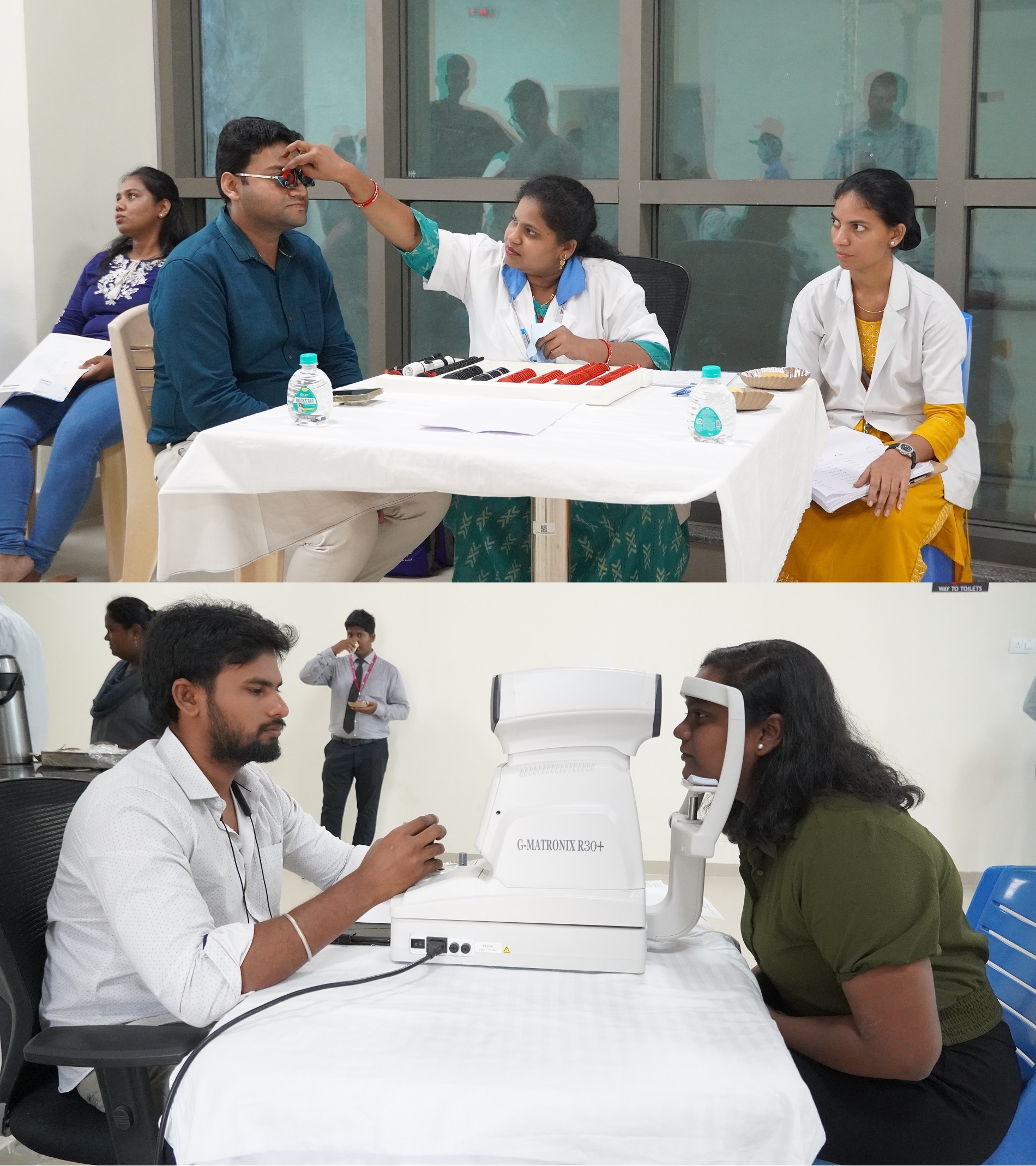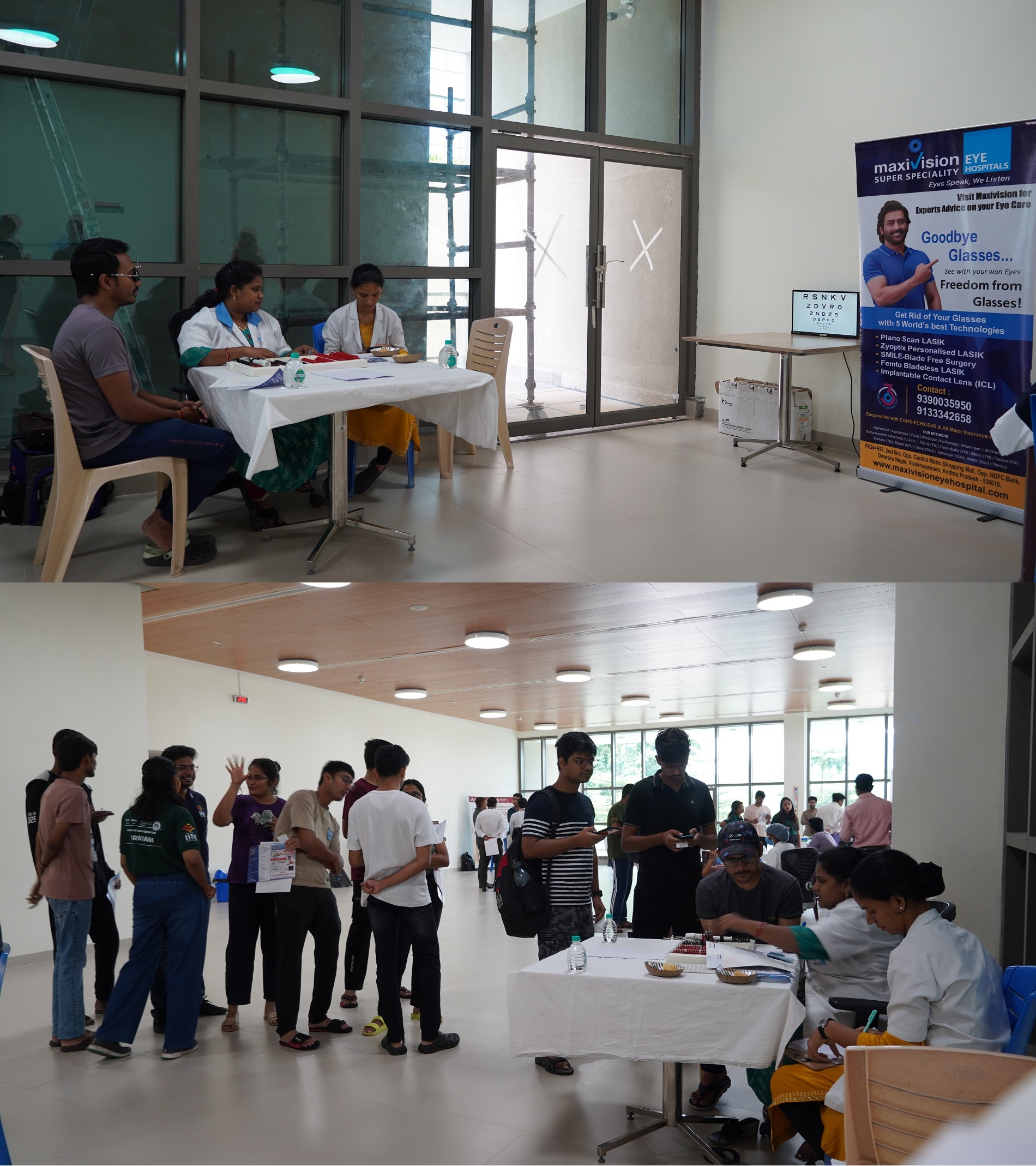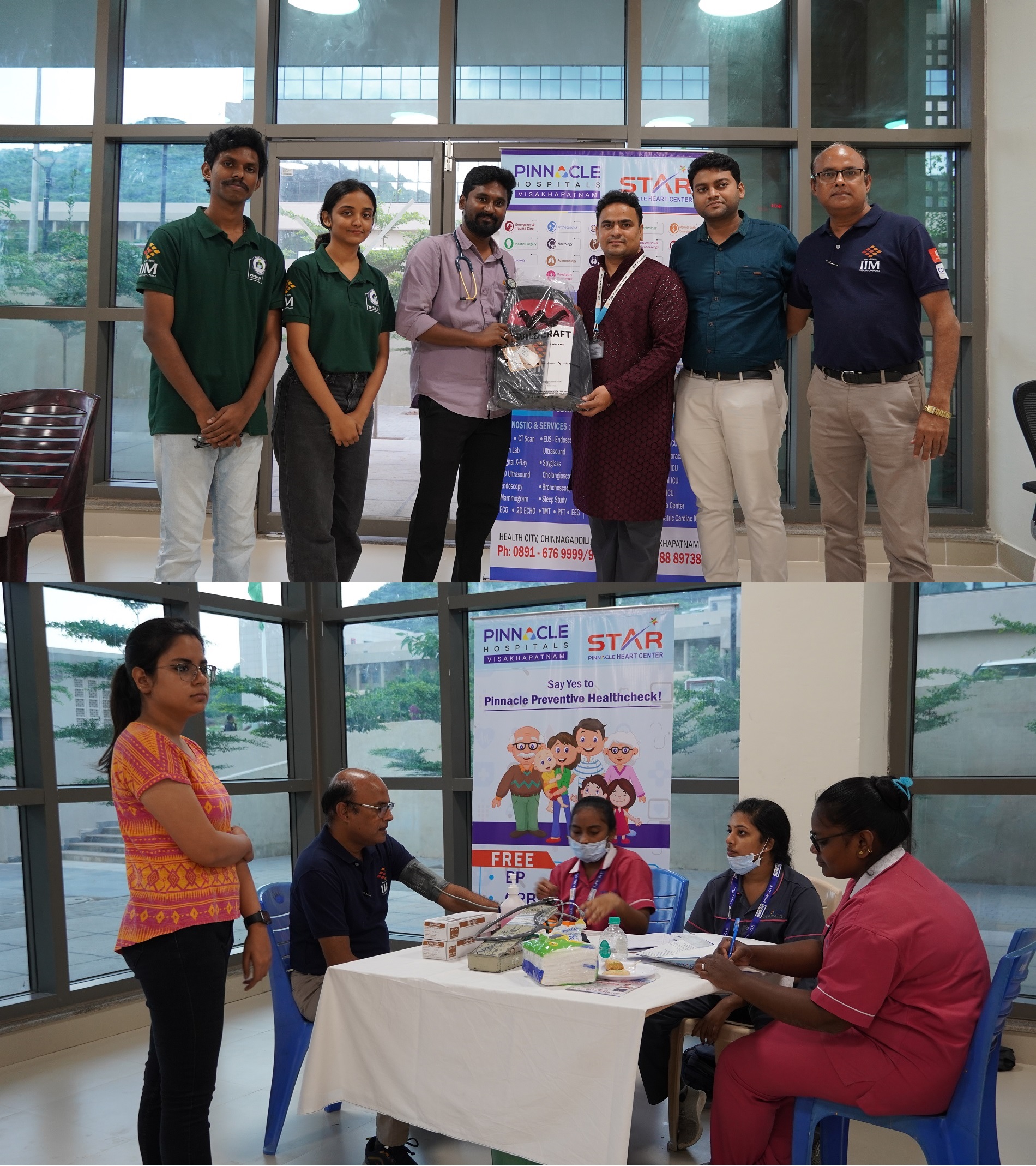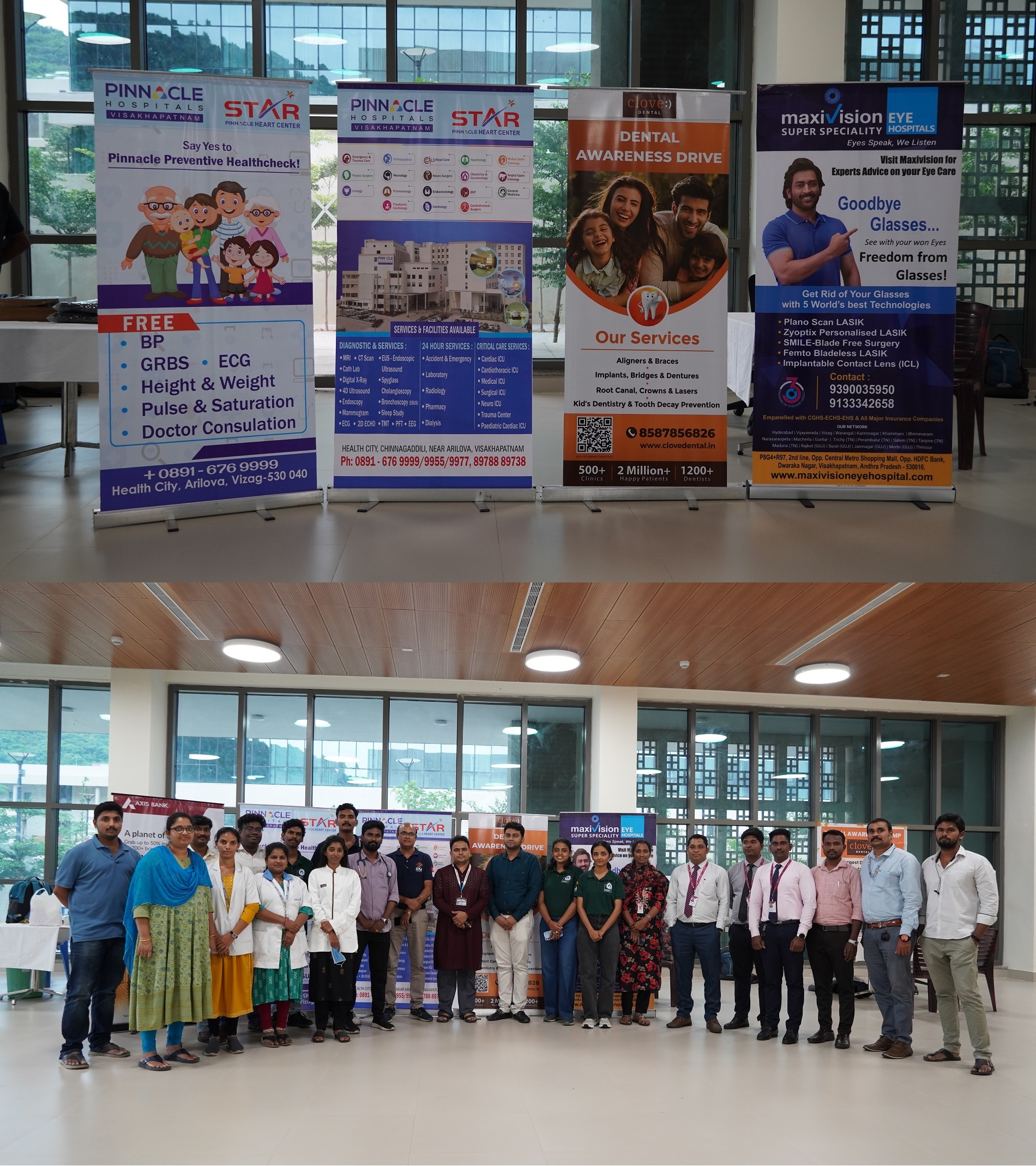Case Conference on Responsible Innovations & Sustainability Practices (CRISP)
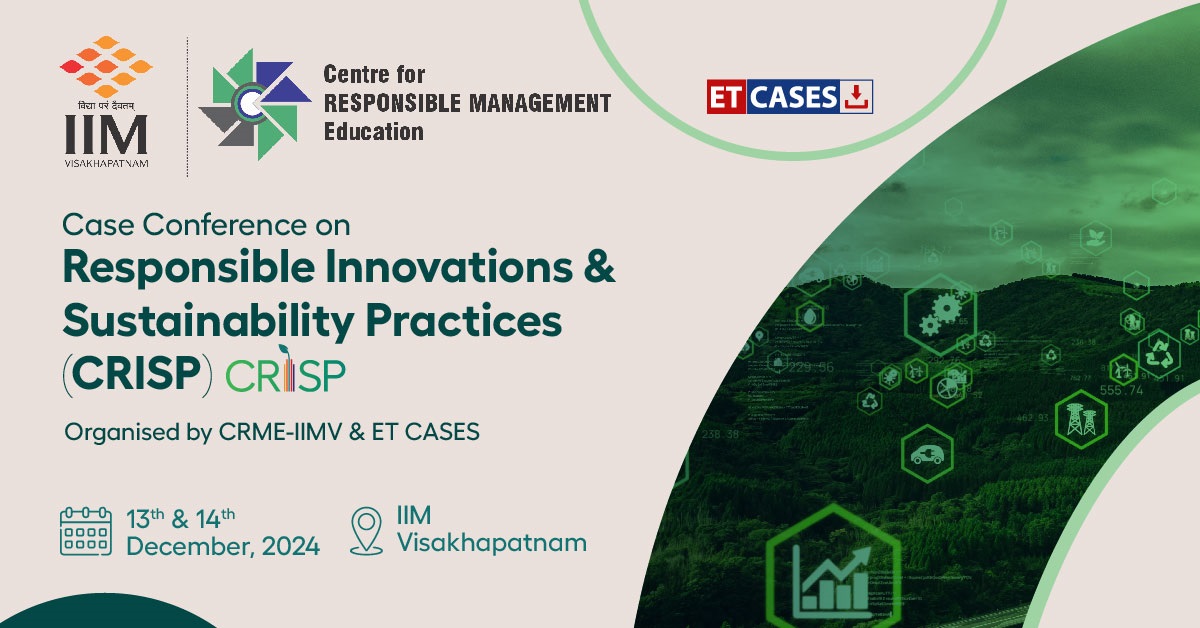
Sustainability has emerged as a critical focus area for businesses, governments, and communities worldwide. Integrating sustainable practices within organisational strategies is crucial for long-term growth and societal well-being. In light of this, the Centre for Responsible Management Education (CRME) at the Indian Institute of Management Visakhapatnam (IIMV) is organising a Case Conference on Sustainability in collaboration with ET CASES. This conference aims to bring together academicians, industry leaders, policymakers, and students to discuss and deliberate on sustainable practices, innovations, and challenges. Case Conference on Responsible Innovations & Sustainability Practices (CRISP) focuses on two important aspects of the IIMV's mission, i.e., Innovation and Sustainability. CRISP is aimed at giving a fillip to sustainability practices by synthesising and advocating best practices. Also, it aims to advance management education that is responsible, sustainable, and aligned with global standards and Sustainable Development Goals (SDGs). This conference is designed to serve multiple stakeholders – academicians, research scholars, industry professionals, students, NGOs & Foundations driving sustainability mandate – while also fulfilling key commitments towards international accreditation and the Principles for Responsible Management Education (PRME)
About Centre for Responsible Management Education
In today's dynamic and interconnected world, the role of business education extends far beyond the mere transmission of technical skills. The ethos of responsible management is becoming increasingly crucial as businesses navigate complex ethical, social, and environmental challenges. Recognising this imperative, the Indian Institute of Management Visakhapatnam established the Centre for Responsible Management Education (CRME). The CRME is dedicated to advancing the principles of ethical leadership, sustainability, and social responsibility within the realm of business education.
Objectives: The key objectives of the CRME include the following:
- Promoting Ethical Leadership: Foster a culture of ethical decision-making and leadership among students, faculty, and practitioners.
- Advancing Sustainability Practices: Explore and disseminate best practices for integrating sustainable development principles into business operations and curriculum.
- Engaging Stakeholders: Facilitate collaboration and dialogue among academia, industry, government, and civil society to address pressing societal challenges.
- Enhancing Curriculum Development: Support the integration of responsible management principles into business school curricula at IIMV through research, workshops, and resource development.
- Fostering Research and Innovation: Encourage interdisciplinary research that contributes to the advancement of responsible management theory and practice.
Message from the Director IIMV
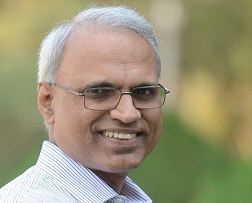
Prof. M Chandrasekhar
Director
The British Author and Serial Entrepreneur John Elkington in 1994 popularized the phrase Triple Bottomline, i.e., focus on People, Planet and Profit. These days, we are emphasizing the same as ESG – or Environmental, Social, and Governance. Planet and People as the Purpose are the drivers of Prosperity in the true sense. The SDGs essentially urge the professionals to practise the same.
Professor Rebecca Henderson of Harvard Business School says enterprises of today have a shared-value opportunity. While “Doing Well†may mean earning profits; “Doing good†will solve social and environmental problems. “Doing well†and “doing good†are thus intertwined, and successful business strategies include both, she avers.
Imperatives for the enterprises of the day are therefore to constantly scrutinize role and responsibilities to stakeholders and recognize linkage between the purpose (why they exist) and the ESG.
Practising the seven PRME principles, we at the Centre for Responsible Management Education would endeavour to mainstream the above into our management-education, management-research and allied knowledge activities.
We are starting the CRME with modest activities and are committed to expanding the same in scale and scope, sourcing resources from entities and enterprises that believe in these principles and place trust in us in the practice and advocacy thereof, and in extending policy and capacity building support for the same.
Message from the Chair - CRME

Prof. Amit B Chakrabarti
Chair - CRME
Welcome to the Centre for Responsible Management Education (CRME) at the Indian Institute of Management Visakhapatnam. As the Chair of CRME, it is my pleasure to extend a warm greeting to you all.
At our centre, we are committed to nurturing the next generation of leaders who will not only excel in the competitive landscape of business but will also champion the principles of responsibility, sustainability, and ethical conduct. We firmly believe that the future of management lies in the hands of those who can seamlessly integrate innovation with a profound sense of social and environmental stewardship.
In today's rapidly evolving world, the challenges facing businesses, governments, and societies are more complex and interconnected than ever before. Issues such as climate change, social inequality, and economic instability demand urgent attention and innovative solutions. At the Centre for Responsible Management Education, we are dedicated to equipping our students with the knowledge, skills, and mindset to tackle these challenges head-on.
Our curriculum is designed to go beyond traditional management education, emphasising the importance of responsible leadership and decision-making. Through a combination of rigorous academic coursework, real-world case studies, and experiential learning opportunities, our students gain a deep understanding of the interconnectedness between business, government, and society.
Furthermore, our centre serves as a hub for research, collaboration, and knowledge exchange. We actively engage with industry leaders, policymakers, and community stakeholders to foster dialogue and drive positive change. Through our partnerships and initiatives, we aim to catalyse innovation and create impact at both the local and global levels.
As Chair, I am immensely proud of the work that our faculty, staff, and students are doing to advance the mission of responsible management education. Together, we are building a community of leaders who are not only capable of navigating the complexities of the modern world but are also committed to making a difference.
Whether you are a prospective student, a partner organisation, or simply interested in learning more about our centre, I invite you to explore our website and discover the exciting opportunities that await you at the Centre for Responsible Management Education.
Thank you for your interest and support.
Research
We study people, organisations, institutions, and the state of the world to inspire responsible management and education practice.
The Centre for Responsible Management Education at the Indian Institute of Management Visakhapatnam promotes publication in peer-reviewed journals and case centres of international repute. A number of these publications are aimed at SDG-related objectives. A few of the recent publications are mentioned below:
Publications
Chakrabarti, A.B. and Krishnan, Kaveri (Forthcoming) “Impact of Institutional Ownership Heterogeneity on Sustainability Spending of Portfolio Firms: The Moderating Role of Credit Rating†Asia Pacific Sustainable Development Journal.
ABSTRACT: This study examines the influence of institutional owners on the sustainability spending of portfolio firms, considering dissimilarities in investment horizons and changes in the credit rating. Using a dataset comprising 24,822 observations from 2,804 Indian firms over a twenty-two-year period (2000 to 2021), the study tests hypotheses grounded in agency and institutional theories. The study reveals that firms with Domestic Institutional Investors (DIIs) allocate greater resources to sustainability compared to those with Foreign Institutional Investors (FIIs), attributed to differences in their investment horizons and governance practices that play a role in resisting isomorphic pressures to enhance credit ratings.
Chakrabarti, A.B. (2023) “Mind your own Business: Ownership and its influence on sustainability†Safety Science: 157(105926) 1-12 DOI: 10.1016/j.ssci.2022.105926
ABSTRACT: The study highlights the divergence in resource allocation towards corporate social responsibility (CSR) and health, safety, and wellbeing (HSW) across the different ownership categories. The study looks at CSR and HSW investments as part of the firm’s external and internal sustainability objectives, respectively. This study uses panel data multiple regression with ordinary least square random-effects model on a sample of 4158 Indian firms within the period 2014 to 2020 with a total of 24,168 observations to test its hypothesis. The results indicate that state-owned enterprises (SOEs) have a substantially higher impact than private-sector firms on sustainability initiatives. Meanwhile, there is heterogeneity in the resource allocation on sustainability by the different ownership categories in the private sector. On the other hand, foreign institutional investors (FIIs) stimulate sustainability investments while being predominantly present in some of the worst CSR performers.
Case Studies
Karthika S and Amit B Chakrabarti (2023) “Brandix: Strategy for Environmental Sustainability†Ivey Publishing. Product ID: W34178
Brandix Group (Brandix), an apparel manufacturing firm with facilities in Sri Lanka, India, and Bangladesh, began its sustainability journey in the early 2000s, much before there were established practices in the apparel manufacturing industry, in an effort to combat and adapt to the challenges of climate change. The company had worked across all of the group’s establishments to ensure waste minimization, material efficiency, energy efficiency, and eco-efficiency in operations. Ashroff Omar, chief executive officer of Brandix, felt the time had come for Brandix to review its sustainability efforts and assess whether its sustainability strategy could be continued. He was planning to expand the scope of sustainability practices beyond firm boundaries, and explore the impact of possible changes in regulations, technology, and challenges from competitors.
The case is intended for graduate-level courses in business strategy, strategic processes, competitiveness, and international business. This case study has been used by the authors in elective courses in strategic resilience and international business. It explores how a company can work together with its stakeholders to expand sustainability practices and achieve competitive advantage in the long run.
Learning Objectives:
Through analyzing the case, students will be able to understand
- how environmental sustainability can be a resource and/or a capability that can lead to differentiation;
- the divergence in priorities among stakeholders while implementing a sustainability strategy;
- how to operationalize circular economy processes in a firm’s supply chain; and
- that environmentally sustainable actions of a company can (and have to) lead to competitive advantage in the long term.
This case addresses the following issues within Sustainability:
- Environmental
- SDG 12 – Responsible Consumption and Production
- SDG 13 – Climate Action
Revathi, K. & Chakrabarti, A.B. (2020) Vedanta: The CSR Challenge. The Case Centre, UK. Product ID: 720-0039-1
Vedanta is a globally diversified natural resource company with interests in Zinc-Lead-Silver; Oil and Gas; Aluminum; Iron Ore; Power; Steel; and Copper. Although it has mining operations across the world, its main market is in India. To fund its ambitious resource-seeking internationalization plan, the company tapped the financial markets in London as well as New York. This move however brought with it, unprecedented scrutiny of company operations at the ground level, something Vedanta was not prepared for. Most of these protests were orchestrated by a handful of non-governmental organizations (NGOs). They perpetually accused Vedanta of polluting the environment and violating human rights. The situation became so grave that the company was unable to start mining projects in several areas where they had already made substantial investments. Moreover, several of their plants were shut down by the combined forces of the Judiciary, Bureaucracy and Politicians. It was in this context that Mahendra Kumar Sharma joined company in the year 2019 as a non-executive independent director. He was also designated as the acting chairperson for CSR. Knowing the severe backlash from the community, Mahendra Kumar Sharma now must come up with a plan of action to mitigate the risks which the company is facing.
Teaching and learning
This item is suitable for postgraduate and executive education courses.
Learning objectives
- To introduce the concept of Corporate Social Responsibility as insurance for reputation and the license to operate.
- To correlate Corporate Social Responsibility as a support for talent recruitment and retention.
- To design a suitable Corporate Social Responsibility strategy for a company under duress to ensure risk mitigation.
- To explain the concepts related to non-market strategy and Corporate Political Activity in particular.
Outreach and Advocacy
We engage people from business, government, civil society, and academia to advance responsible and accountable management education and practice.
The Indian Institute of Management Visakhapatnam (IIMV) is committed to supporting and nurturing budding entrepreneurs from Andhra Pradesh and Telangana in India. IIMV has partnered with NSRCEL, IIMB, to conduct the Women Startup Programme (WSP). This programme aims to encourage entrepreneurship among women by giving them various support like workspace, mentorship, networking opportunities, etc. In a country where gender inequality is a crucial problem, the WSP provides an unprecedented platform for women to become self-reliant and economically independent. To know more about this program click here.
IIM Visakhapatnam, along with the National Productivity Council, DPIIT, MoC&I, GoI, the United Nations Global Compact Network India and India Potash Limited as the industry partner, organised the ‘Andhra Pradesh Sustainability Conclave' on the topic of 'Productivity and Green Growth' at the IIM Visakhapatnam Permanent Campus at Gambheeram on April 20, 2023.
The conclave addressed sustainability issues to promote green growth for a productive and sustainable future. The event featured renowned speakers, including Shri Sundeep K Nayak, IAS, Director General, National Productivity Council. The keynote address at the event was delivered by Shri Ratnesh Jha, Executive Director, UNGCNI. Shri K D Bhardwaj, Director & Group Head - Environment and Climate Action, NPC, delivered the technical presentation on the topic.
Going forward, we aim to partner with like-minded educational institutions to promote our aspirations, document our initiatives, share our lessons learned, and help each other address our challenges. We have not only committed to the PRME but also are an active member in the SDSN. Furthermore the institute has signed an MOU with the UNGC India Chapter to work together in fulfilment of the SDGs.
Student Activities
Swachhata Hi Seva:A Step Towards a Cleaner Tomorrow
Cleanup Drive at the Permanent Campus and Rushikonda Beach
As part of the nationwide Swachhata Hi Seva campaign, running from 17th September to 2nd October 2024, IIM Visakhapatnam organized a Cleanup Drive at both the permanent campus and Rushikonda Beach, with the event facilitated by Vatsalya – the student-run CSR club. This year’s theme, Swachhata Hi Seva (Cleanliness is Service), aligns with India's efforts to improve cleanliness and sanitation while fostering a culture of environmental responsibility and public health awareness. As responsible citizens and students, contributing to this mission is not only about addressing the immediate benefits but also ensuring the long-term sustainability of our environment. The Urgency of the Issue Our oceans and public spaces, including beaches, have become overwhelmed with waste— especially plastics that take centuries to decompose. Studies estimate that 8 million tons of plastic enter the ocean annually, and if current trends continue, by 2050, the ocean could contain more plastic than fish. This poses an existential threat to marine life, biodiversity, and human health. The environmental impact extends far beyond aesthetics, endangering the very ecosystems that sustain our planet. The issue is not abstract—it is visible on our beaches and even within our campuses. If left unchecked, pollution will continue to degrade the environment and reduce the quality of life for future generations. To address this challenge, the Swachhata Hi Seva campaign has played a crucial role in raising awareness and inspiring people to take action toward building a cleaner, healthier environment. Our Efforts: Beach and Campus Cleanup Drive The Beach Cleanup Drive at Rushikonda and the simultaneous Campus Cleanup were not just about removing visible waste; they were about sparking a shift in mindset. Each piece of trash collected was a reminder of the broader environmental challenge and the shared responsibility we all have to address it. The primary objective of this initiative extended beyond simply clearing waste—it aimed to foster a deeper understanding of environmental responsibility and encourage sustainable practices in everyday life. The Call for Collective Action This Cleanup Drive is part of a larger movement that emphasizes sustained action and individual accountability. The Swachhata Hi Seva campaign has been instrumental in educating the public about the interconnection between cleanliness, public health, and environmental conservation. It reminds us that each of us plays a role in keeping our surroundings clean, which ultimately contributes to the well-being of our planet. While the event made a significant impact, the need for consistent and conscious action cannot be overstated. We encourage everyone to rethink their relationship with waste—small changes, like reducing plastic use, disposing of trash responsibly, and regularly participating in cleanup activities, can have far-reaching effects. Acknowledgments The success of the Cleanup Drive was made possible by the strong support of various stakeholders. We extend our heartfelt gratitude to the college administration, especially CAO Jelani Sir, Manager of Hospitality & Facilities Ramu Sir, along with Dilip Sir and Hari Narayana Sir, for endorsing the initiative and providing essential resources. We also thank the housekeeping staff for their hard work and assistance, which ensured smooth execution. A special thanks to the students who dedicated their time and energy to this important cause. Their commitment to protecting the environment and driving positive change is truly commendable. Additionally, we appreciate the efforts of the Student Affairs Council for coordinating the event and ensuring its successful implementation. The Cleanup Drive was not merely an event; it was a statement of our commitment to a cleaner and more sustainable future. We hope that this initiative has inspired others to take ownership of their role in environmental protection, as part of the broader Swachhata Hi Seva movement. Let this effort serve as a reminder that every action counts, and together, we can make a difference. As we move forward, collective action will remain crucial in achieving a cleaner, healthier, and more sustainable future for all.
Health Camp at Indian Institute of Management, Visakhapatnam. 06 September 2024
The free health camp organized as a part of Wellness at IIM V on 06th September 2024, Friday at our IIM V Permanent Campus, was a significant initiative aimed at providing valuable health consultation and assistance to students, faculty and staff.
As the saying goes, "Health is wealth," and in today’s world, maintaining good health is truly a great blessing. Preventive health camps like these play a crucial role in screening for asymptomatic issues, raising awareness and providing guidance for treatment. Such initiatives help us address potential health concerns early and pave the way toward a healthier life.
The event was a collective effort, held at the Auditorium (Foyer Area) of the Institute. It featured a welcome note and an overview of the health camp, which was organized in association with Axis Bank and supported by Pinnacle Hospital, Clove Dental and Max Vision Eye Hospital. This collaborative initiative aimed to enhance the health and well- being of the participants through various medical services and consultations.
Consultations were available to students, faculty and staff from 10:00 AM to 5:00 PM. Over 175 of us took advantage of the camp, receiving free medical services. The camp offered comprehensive consultations, including general health assessments, dental and eye care. Pinnacle Hospital provided BP monitoring, blood sugar testing, ECG and general consultations; Clove Dental conducted dental checkups; and Max Vision Eye Hospital performed eye checkups using advanced AR machines and provided subjective refraction and consultations. The primary aim of the camp was to offer valuable health consultations to those who might not have time to access specialized medical care in their busy schedules.
The free health camp witnessed an enthusiastic response from both students and staff. Numerous attendees received accurate diagnoses and personalized treatment recommendations for their health concerns, enhancing their overall well-being. This personalized approach made the participants feel cared for and valued, fostering a positive interaction between medical professionals and students.
Many praises from guests (Axis Bank, Pinnacle Hospitals, Clove Dental Hospital, Max Vision Eye Care) - for all the arrangements, hospitality and towards our own beautiful campus.
The health camp organized proved to be a resounding success, delivering quality medical assistance, knowledge and awareness to participants. The event exemplified the college's commitment to its students' well-being. As the event concluded, Dr. V Bhaskar Ram thanked Pinnacle Hospital, Clove Dental, and Max Vision Eye Hospital for their services, free of cost, reflecting a rare commitment to the well-being of our community. He also extended his heartfelt vote of thanks to the nurses and members of Team Vatsalya for coming forward and helping to organize the camp successfully. The health camp ended with felicitating the guest doctors with mementos on behalf of the institute.
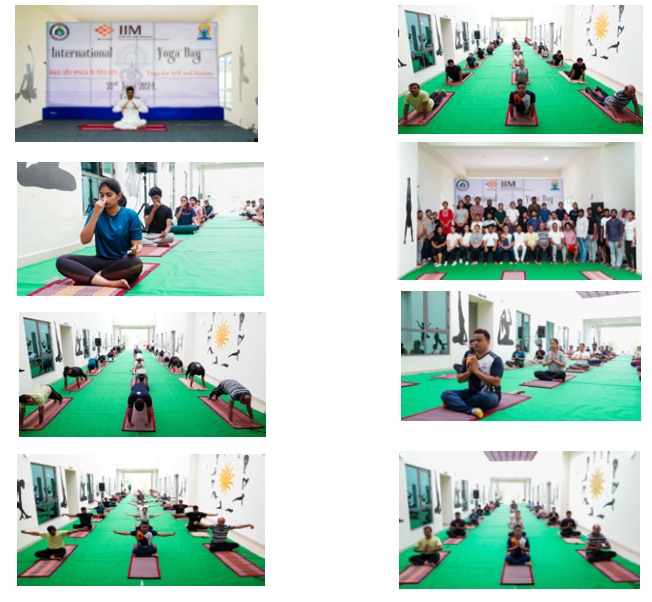
International Yoga Day Celebration at IIM Visakhapatnam: IIM Visakhapatnam celebrated International Yoga Day with enthusiastic participation from students, faculty, and community members. The event, organized by the administration along with the Sports Club and the CSR Club, Vatsalya, aimed to highlight yoga's physical, mental, and spiritual benefits, fostering a sense of well-being and community. This year's theme for International Yoga Day was "Yoga for Self and Society," underscoring the dual benefits of yoga practice. The session was inaugurated by an experienced yoga instructor, Mr. Ravi, who led the group through a series of activities to enhance their understanding and practice of yoga.
Event Highlights:
Warm-Up Exercises: The session began with Mr. Ravi guiding participants through basic warm-up exercises. These exercises prepared the body for the more intensive yoga practices that followed, ensuring participants were physically ready and reducing the risk of injury.
Asana Practice: Following the warm-up, Mr. Ravi introduced participants to a series of asanas (yoga postures). He emphasized the importance of proper alignment and breathing techniques, which are crucial for maximizing the benefits of each posture. The participants, ranging from beginners to more experienced practitioners, engaged actively, appreciating the detailed instructions and corrections provided by the instructor.
Discussion on Yoga's Benefits: The session concluded with an insightful discussion led by Mr. Ravi on the importance of regular yoga practice. He elaborated on the numerous physical, mental, and spiritual benefits of yoga, such as improved flexibility, enhanced mental clarity, and a deeper sense of inner peace. Mr. Ravi also highlighted how yoga can contribute to societal harmony by promoting mindfulness and compassion.
The International Yoga Day celebration at IIM Visakhapatnam was a resounding success, bringing together various members of the institute and the broader community in a shared pursuit of wellness. The event provided a platform for participants to experience the immediate benefits of yoga and inspired many to incorporate yoga into their daily routines. By aligning with the theme "Yoga for Self and Society," the celebration underscored the powerful role of yoga in fostering individual well-being and collective harmony.
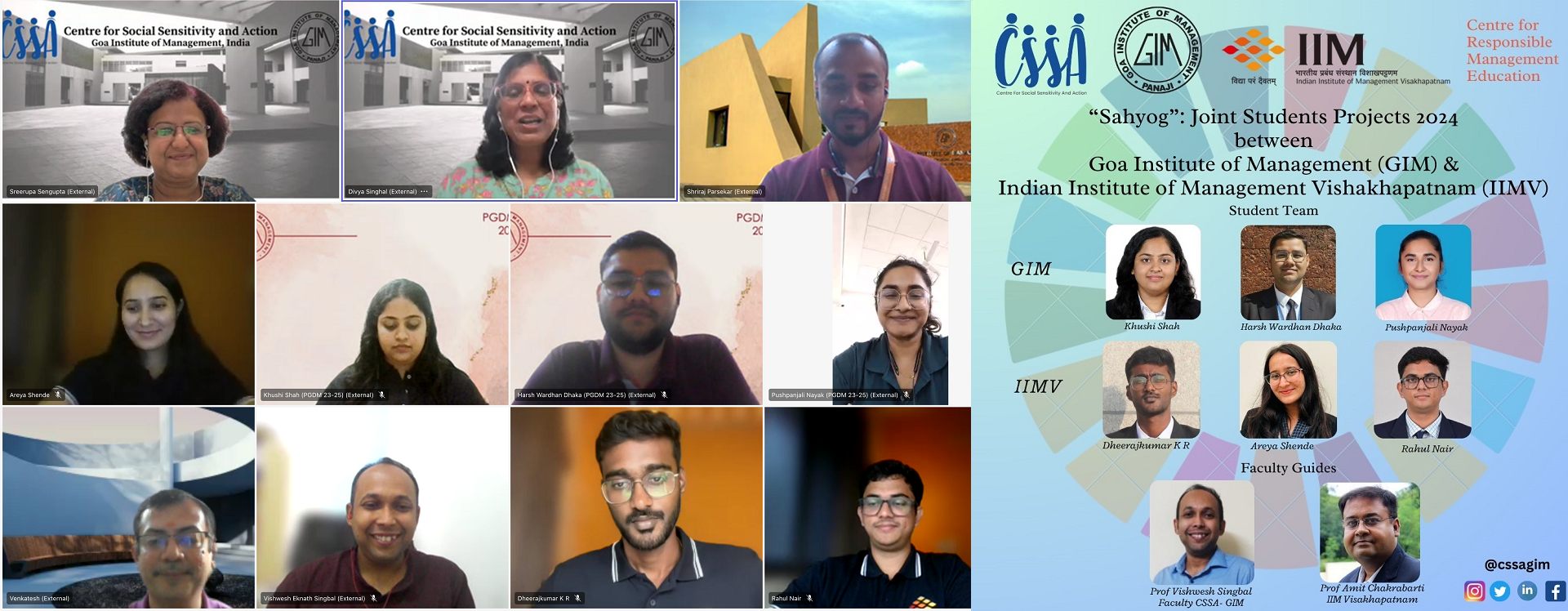
CRME initiates student project on Circular Fashion: The Centre for Responsible Management Education (CRME) at the Indian Institute of Management Visakhapatnam (IIMV) today kicked off the student project on ‘Understanding Circular Fashion in India’. Three students from IIMV will collaborate with three of their counterparts from the Goa Institute of Management (GIM). The students representing IIMV are Rahul Nair, Areya Shende, and Dheeraj Kumar K R.IIMV is a signatory to the Principles of Responsible Management Education (PRME). As part of its commitment to the PRME, IIMV is committed to fostering partnerships with like minded institutes on topics related to the UN SDGs. These projects give an opportunity for budding managers to think about and find solutions to sustainability related issues.
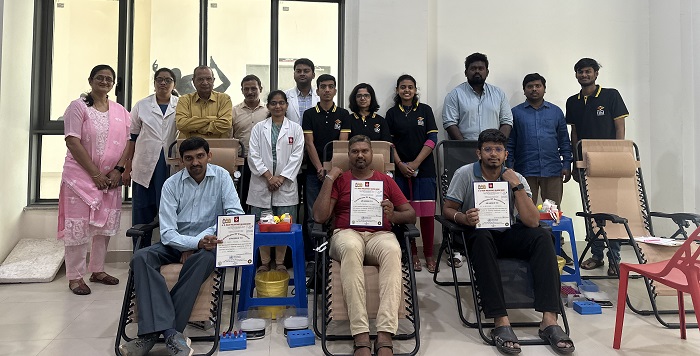
We advance responsible management education to foster inclusive prosperity in a world of thriving ecosystems.
The Indian Institute of Management Visakhapatnam has a student organization named Vatsalya which works in close coordination with the Centre for Responsible Management Education. It is the social activities club of the IIIM Visakhapatnam. The vision of this club is to be a helping hand to the needy to the possible extent and bring a visible change in the Society around us. The club aims to bring awareness to the existing issues and encourage people to work for the upliftment of the nation. They hold various events such as ‘Dan Utsav’, Donation Camps and help different schools, orphanages, and old age homes. With the support of the IIMV family, they collect and send relief funds whenever needed. They work with other non-profit organizations based on the need or issue and extend their support in all possible ways. With a firm dedication, Vatsalya is determined to work for the betterment of Society and bring a positive change.
Vatsalya
The Indian Institute of Management Visakhapatnam has a student organization named Vatsalya which works in close coordination with the Centre for Responsible Management Education. It is the social activities club of the IIIM Visakhapatnam. The vision of this club is to be a helping hand to the needy to the possible extent and bring a visible change in the Society around us. The club aims to bring awareness to the existing issues and encourage people to work for the upliftment of the nation. They hold various events such as ‘Dan Utsav’, Donation Camps and help different schools, orphanages, and old age homes. With the support of the IIMV family, they collect and send relief funds whenever needed. They work with other non-profit organizations based on the need or issue and extend their support in all possible ways. With a firm dedication, Vatsalya is determined to work for the betterment of Society and bring a positive change.
Vatsalya, the Social Responsibility club of the Indian Institute of Management Visakhapatnam, strives to sensitize the future business leaders of the institute towards social responsibilities and the importance of corporate social responsibility (CSR) and environmental, social, and governance (ESG). VÄtsalya (वातà¥à¤¸à¤²à¥à¤¯) refers to "loving-kindness," which means upholding the promise to provide altruistic services to enhance the community's standard of living. Vatsalya offers a helping hand and basic amenities to the underprivileged, as well as spread awareness related to social issues and physical and mental well-being for the upliftment of society. To fulfill the requirements of those in need, we make the most of the knowledge and resources at our disposal. With the help of the administration, staff, and Student Affairs Council at IIMV, we collect and send relief funds when natural disasters happen. Vatsalya works in tandem with several non-profit organizations for the betterment of society, thereby enabling IIM Visakhapatnam to develop a network hub of NGOs to bring visible change in society. Vatsalya has collaborated with the Ekam Foundation, Mumbai, to provide financial assistance to children through the Surgery Support Program. Vatsalya has also collaborated with SAKONSA, a social welfare foundation that focuses on developing a broader mindset about UN goals.
Vision: To uplift our society and create a sense of empathy among people.
Mission: We “Grow by Giving†and “Live by Caringâ€, not just for people but also for the environment
Core Values: With a firm dedication, Vatsalya carries forward the legacy of working for the betterment of society and bringing positive change.
Projects 2023-24
Important Links




